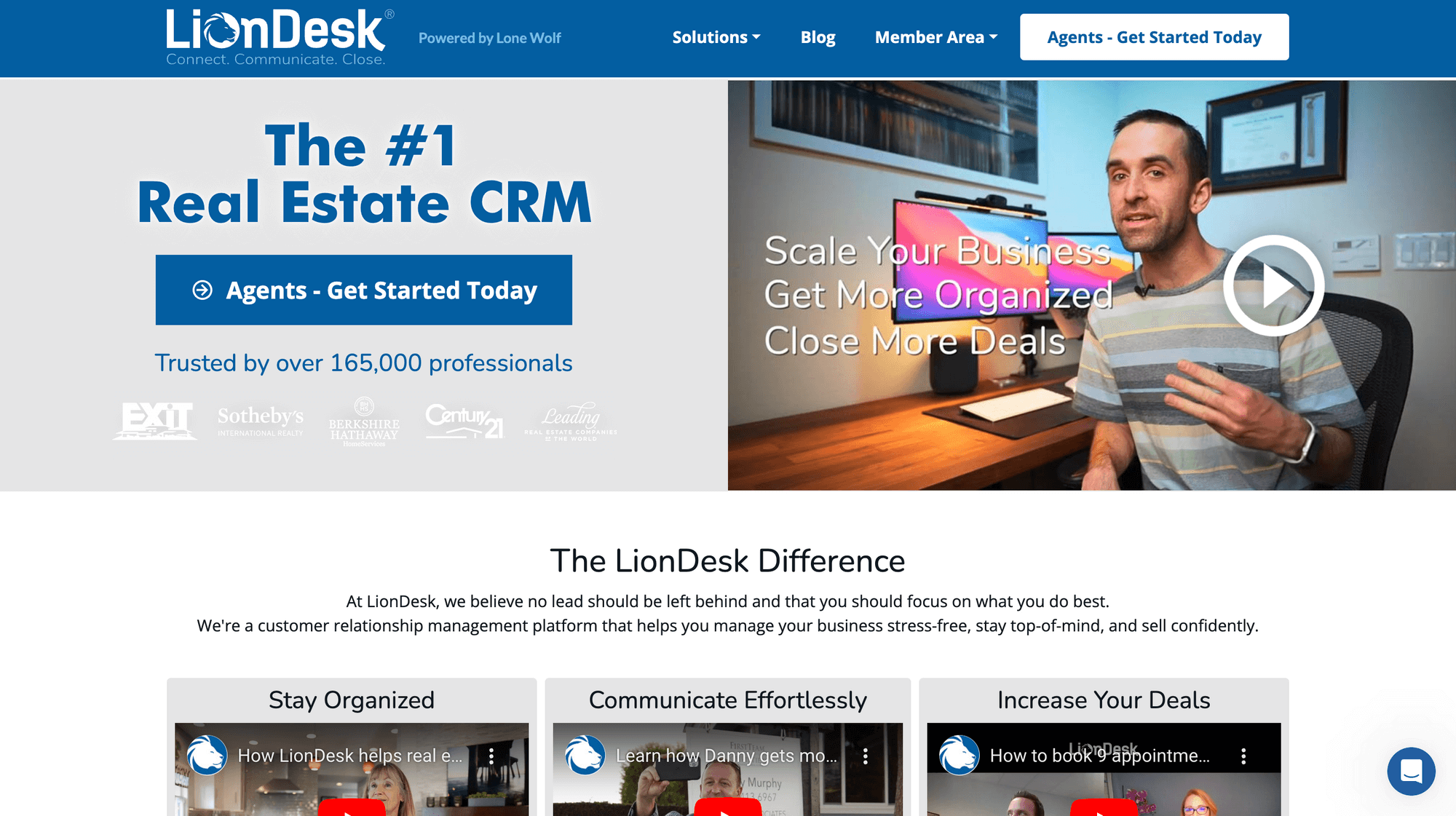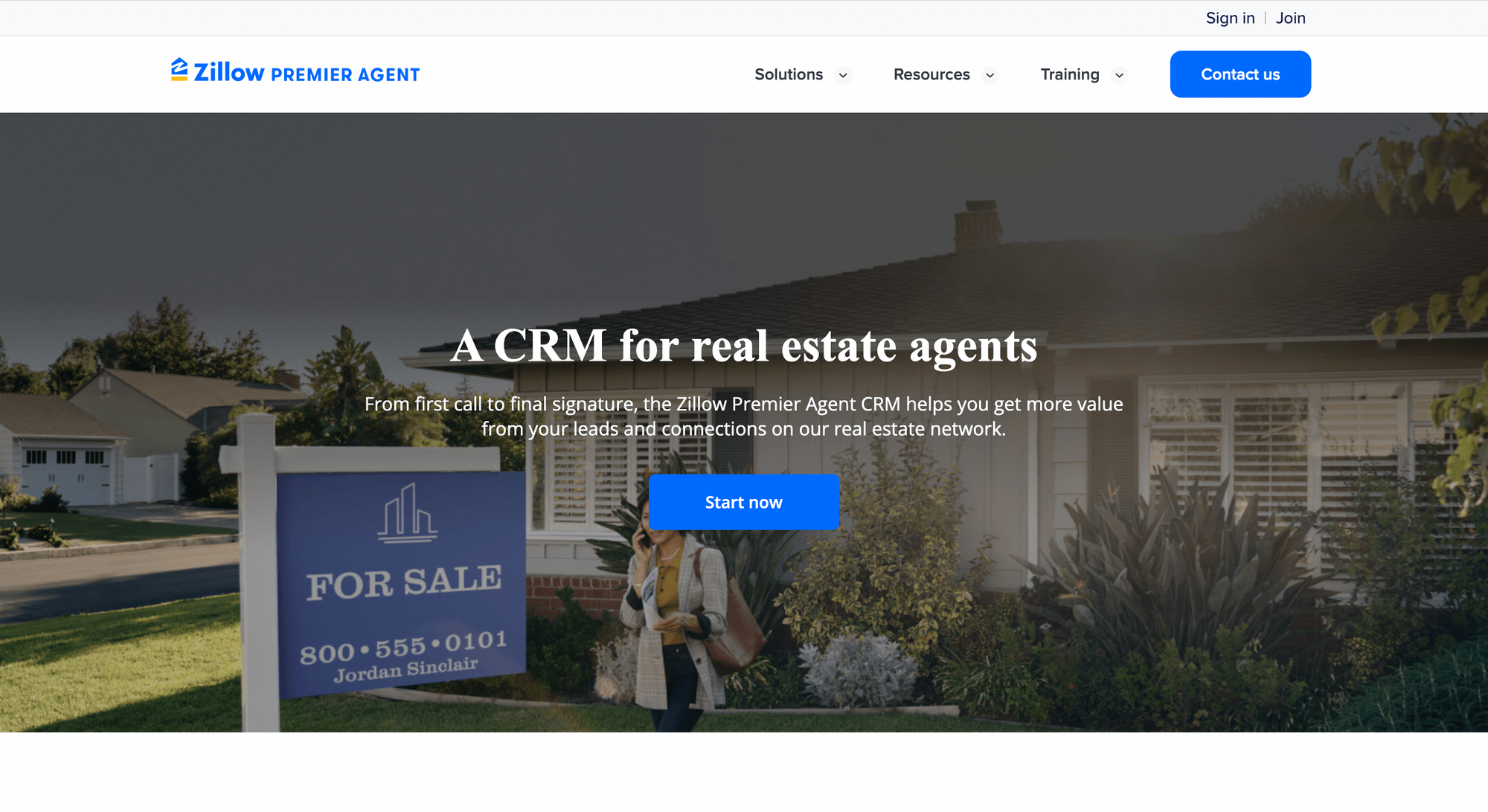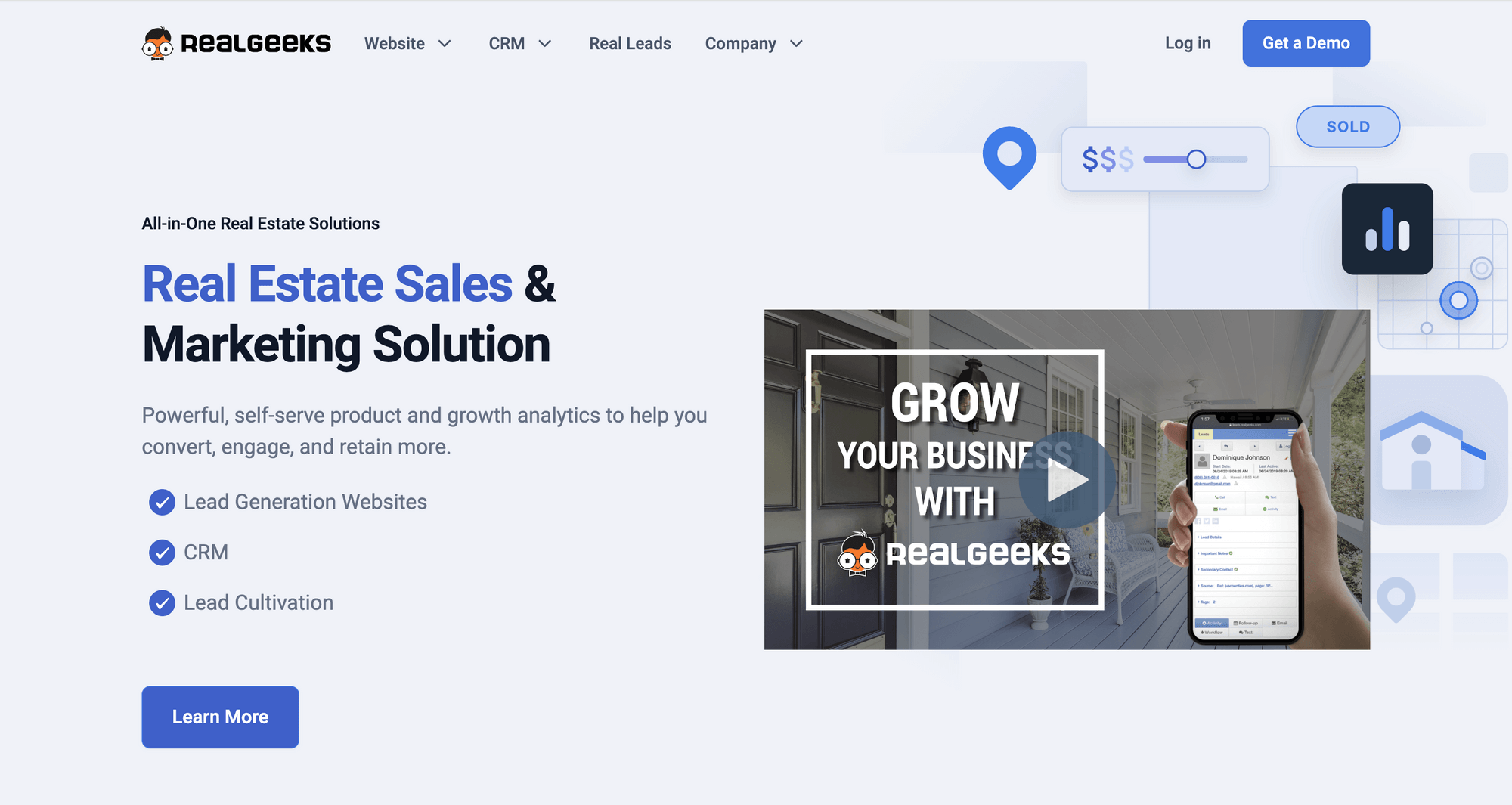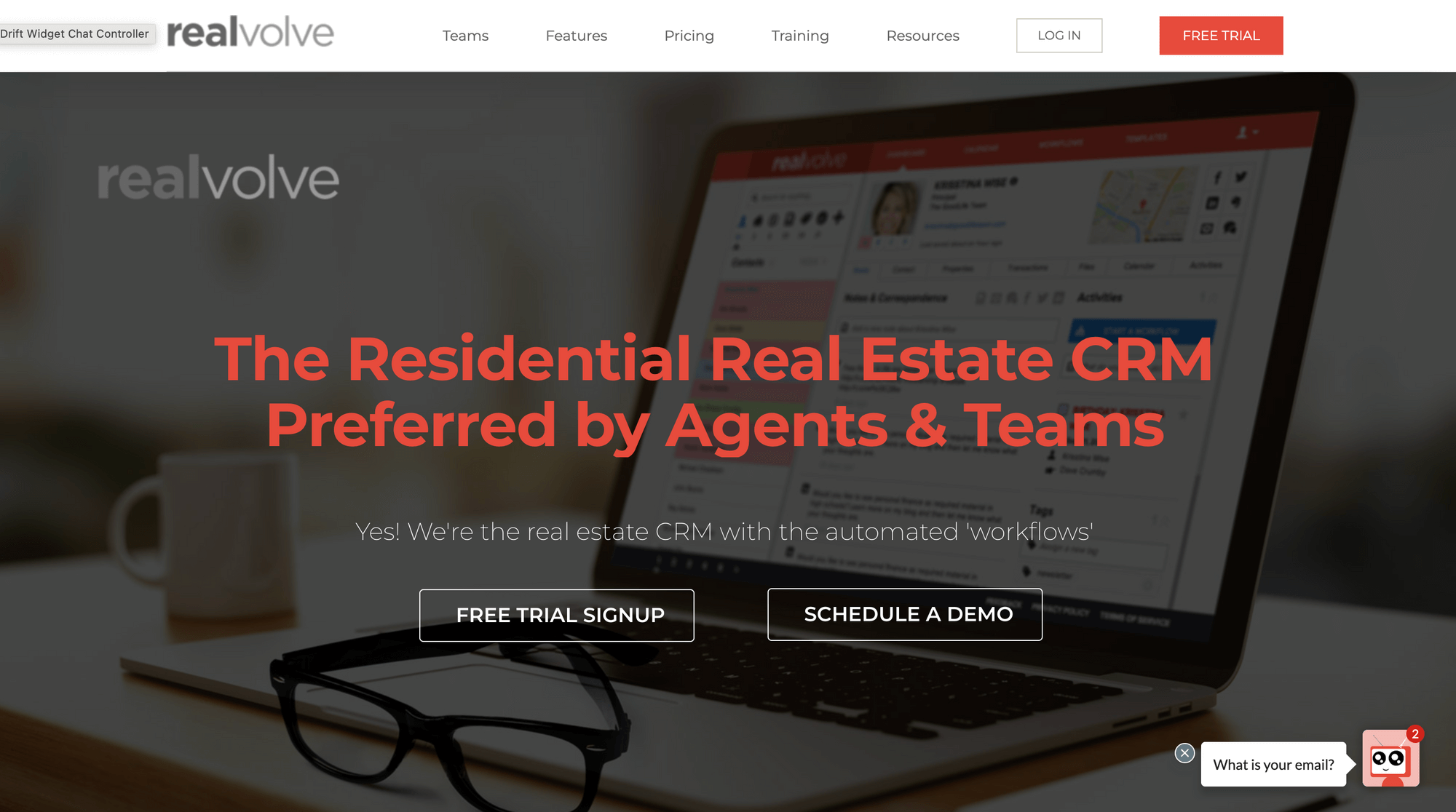In the dynamic world of real estate, having the best CRM for real estate can be the difference between a thriving business and one that's struggling to keep up.
The best real estate CRM streamlines your operations and enhances client relationships, ultimately boosting your bottom line. Whether you're a seasoned real estate agent or just starting out, the best real estate CRM systems can transform your business.
But with a plethora of options available, how do you choose the best CRM for realtors?
This article is your guide, highlighting the key real estate CRM features to look for and why they're essential. So, let's delve into the world of top CRM for real estate and discover how they can revolutionise your operations.
What is a real estate CRM?
A real estate CRM is a piece of software that assists real estate agents in managing their interactions with current and potential clients. It's a tool that organises real estate agency information, collects leads from multiple sources, and maintains their data in a uniform fashion.
Types of real estate CRM systems
There are multiple different types of real estate CRM systems that exist. These are…
- In-house real estate CRM systems, aka on-premise real estate CRM systems. These CRM systems are hosted locally on the companies' own servers, rather than the second option on this list.
- Cloud-based real estate CRM systems. These types of CRM systems are hosted on the cloud, meaning that they’re hosted on a remote server that users access through their web browser/app. This type of CRM shines best because it’s able to be updated without interruption to the customers or any action on the customers' side at all.
- Real estate transaction management software. This is a system that is meant for managing the process of overseeing and managing the various aspects of a real estate transaction from start to finish. It involves coordinating and facilitating the necessary tasks and paperwork involved in buying, selling, or leasing a property.
The best CRM for real estate has more functions than just being a digital address book. It's a comprehensive system that helps real estate agents with things such as…
- Staying in touch with old clients
- Improving communication between team members
- Finding and contacting new clients
- Generating more referrals
In essence, a real estate CRM system is a realtor's best friend. It does the heavy lifting for realtors who have grown tired of their unsociable hours, anxious from constant rejection, and tired of navigating archaic and complicated spreadsheet CRM systems. It's like having a personal assistant that never sleeps, constantly working behind the scenes to ensure you're providing the best service possible to your clients.
So, when we talk about the best CRM for real estate agents, we're talking about a tool that can revolutionise the way you do business. It's a tool that can take your real estate business from good to great, helping you to provide a better service to your clients and ultimately, sell more properties.
Let’s delve into why real estate businesses need the best real estate CRM!
Why do real estate businesses need the best real estate CRM?
The real estate industry is a unique beast, with its own set of challenges and opportunities. It's a sector where relationships are paramount, and the best CRM for real estate can be a game-changer. But why exactly do real estate businesses need CRM software to function and prosper? Let's delve into the reasons…
Real estate CRM tells you where your leads come from
As a modern real estate agent, you're likely running several lead generation campaigns simultaneously. It could be that leads are coming from your website, open houses, direct mail, or even your outstanding email marketing outreach or text messaging outreach (via text message API or SMS software). A real estate CRM system is an excellent tool for pinpointing the sources that bring leads personally, helping you understand their readiness to make a purchase, their entry point into your sales funnel, and their qualifications.
Then, you can make data-drive decisions regarding the activities that need to be scaled and the ones that can be held back.
Real estate CRM software allows you to prioritise leads
Not all leads are created equal. While good realtors try to help out every single client, some fish are bigger to fry, like that one client who wants to buy a mansion by tomorrow latest.
Qualifying leads before you start nurturing them is in your best interest. Many real estate CRM systems allow users to assess the quality of leads that enter the system and, based on a variety of factors, decide whether or not they’re high-priority or low-priority leads.
The best real estate CRM systems help organise and centralise customer data
Real estate is competitive, as we’re sure you know, and you need to try out many approaches before you reach out to leads and convert them into customers. This often involves using several means of communication - email, social media, phone, and messengers. A successful real estate agent needs to store all information in a CRM system for immediate access.
Moreover, a CRM system ensures the security of customer data. As real estate agents, you deal with a lot of sensitive information that both you, and your clients, would really not like to fall into the wrong hands. Corporate espionage and competitors constantly undercutting you and stealing your clients are all too common in the industry too, so your data needs to be well protected away from prying eyes.
Real estate CRM system improves the quality of lead nurturing
As your real estate business starts growing and becomes more successful, you’ll find yourself in a situation where you’re trying to negotiate with close to 50, 100, or even 1000 potential customers every week. Modern CRM tools offer a visualised sales pipeline, which is a perfect set-up for you to keep track of the progress you’re making with each customer.
Real estate CRM software also allows you to create custom views to always remember about all the deals you currently have open. How many clients are making a decision right now? Who’s about to be shown a property? Who must you follow up with and remind them of your deal? With a CRM, all of these questions become easy to track, and answer, ensuring no potential customer falls through the cracks.
Real estate CRM software helps to scale out your referral process.
Referrals are a big deal in real estate. CRM software allows you to become a real friend to your leads and customers even after the deal is won, so when they come to sell their property, you’ll be the first they’ll call. It increases the level of customer satisfaction, improves the relationship between you and your customers, and patterns your referrals.

Real estate CRM software helps automate routine processes
With the help of sales automation functionality the best real estate CRM systems offer, real estate agents can drastically increase their productivity, as they'll focus on showing property, negotiating with potential clients, and closing deals, instead of entering data, capturing and nurturing leads, and movind deals from one stage of the sales pipeline to another.
Moreover, a real estate CRM with the sales automation functionality also allows real estate agents to keep to deadlines better with automatic reminders and task notifications.
For more detailed insights, you can check out this article exploring the reasons why a real estate agent might need a CRM.
Must-have features of the best CRM for real estate
Choosing the best CRM for real estate is no small task. With a plethora of options available, it's crucial to know what features to look for. After all, the best real estate CRM software is one that meets your specific needs and helps you streamline your operations. So, what are the must-have features of the best CRM for realtors? Let's explore…
Integration with Calendar
In the world of real estate, you often have to meet or call clients at a specific time. Keeping track of all of that when dealing with tens of customers a day can get rather tricky. With a real estate CRM, your calendar reminders will automatically be created from customer cards and added to your calendar. Essentially reducing the possibility of human error to near-zero
Automation functionality
A top real estate CRM should allow you to automate repetitive tasks, freeing up your time to focus on more strategic activities. This includes sending emails, scheduling appointments, managing tasks, and sending follow-up reminders. Here are some examples of tasks you can automate with this feature…
- Sending follow-up emails to clients
- Automatically assigning responsible real estate agents to deals
- Receiving notifications about deal updates
Integration with VoIP telephony services
Imagine having to pick up your phone, enter the customer's number, and calling them with your phone to your ear for minutes. Doesn’t sound bad, does it? Unless, of course, you’re a real estate agent and have done this loop at least 20-30 times in 24 hours at least once. Don’t even get us started on your phone buzzing early in the morning on a Saturday.
With a CRM, you can use VoIP dialers right from the customer card, allowing you to call your customer with ease and with a single click.
Property search
In the fast-paced world of real estate, having the ability to quickly search for properties within a certain area can save time when looking for potential listings or managing current ones.
Single property websites
The best real estate CRM software should offer the ability to quickly create custom single property websites within your CRM system. This can be extremely helpful in showcasing a listing and promoting it online.
Automatically creating a single-listing website to send out to your customers straight from the CRM is a very handy feature for real estate agencies to have.
Transaction management
A robust real estate CRM should help manage the transaction from start to finish once a sale is made. This includes tracking documents, managing payments, and keeping everyone informed throughout each step of the process.
In-depth analytics & reporting
Detailed analytics and reporting on the sales process can help track performance and make data-driven decisions. The best real estate CRM systems should offer robust reporting capabilities, helping you understand your business better.
Sales pipeline management
An important part of the real estate business is the customer journey with your company. If you take too long to respond to a client, or can’t find them a suitable property for long enough, they’ll take their business elsewhere.
Proper real estate CRM software should allow you to create visualised and insightful sales pipelines that allow you to track which stage of their journey your customers are on, and how long they’ve been there.
Sales pipelines are a key figure in managing your customer journey, so being able to customise and build them is definitely a must for any real-estate CRM.
Compatibility with mobile phones
In the fast-paced world of real estate, having access to your CRM on the go is crucial. Remember that one time you had to check the notes you have on the client while already on the way to meet them? A mobile compatible CRM would sure have come in handy there. The best CRM for real estate agents should offer a mobile app or a mobile-friendly interface, allowing you to access your data and manage your tasks on the go.
Customisation and flexibility
The best CRM for real estate should offer a high level of customisation and flexibility. This includes features such as custom fields, custom workflows, and more. The ability to tailor your CRM system to specific needs and preferences improves efficiency and effectiveness, making it a truly indispensable tool in your real estate business.
These features are considered essential in a CRM for real estate, but depending on the specific needs of the real estate business or agent, there may be other important features to consider. The best real estate CRM is one that can adapt to your business, not the other way around.
What is the best real estate CRM software: 8 best real estate CRMs for your business
NetHunt CRM — A powerhouse that lives inside of your inbox

NetHunt CRM is a comprehensive, cloud-based CRM solution designed specifically for businesses that use Gmail as their main communication channel. Since its inception in 2015, NetHunt CRM has continuously evolved, and reached a point where it can meet the unique needs of real estate agents and perform as a real estate CRM, brokers, investors, realtors, and small and medium-sized real estate agencies. This makes NetHunt CRM a compelling alternative to Pipedrive for those in the real estate industry seeking a CRM with strong email integration and tailored functionalities.
NetHunt CRM can provide a significant benefit to businesses in the real estate industry with its seamless Gmail integration and comprehensive lead data organisation. It provides a centralised platform for capturing and organising lead data, complete with a full communication history for each client or lead. This enables real estate professionals to respond quickly and personalise interactions.
The standout feature of NetHunt CRM is its visualised sales pipeline management, which automates lead capture and nurturing. Alongside its user-friendly interface and accessibility from anywhere, NetHunt CRM supports collaborative work and offers features like email marketing and a real estate commission calculator, making it a comprehensive tool for enhancing productivity in real estate agencies.
Key features of NetHunt CRM for real estate businesses:
- Contact management functionality
- Sales automation functionality
- Email marketing functionality (email templates, mass emailing, email tracking, email analytics, etc.)
- Integration with VoIP telephony services
- Integration with Instagram, and messenger apps (WhatsApp, Facebook Messenger, Telegram)
- Integration with Zapier
- Integration with Gmail and Google Workspace apps
- Collaborative functionality (@mentions, comments, shared database)
- Pipeline management
- Reporting functionality
- Mobile app (Android and iOS)
Pros of NetHunt CRM for real estate…
✅ Seamless integration with Gmail, providing a centralised database for real estate transactions
✅ Advanced sales automation, including automated lead capture and nurturing, ideal for managing real estate leads
✅ Comprehensive email marketing functionality, perfect for real estate campaigns, including bulk emails, tracking, templates, and drip campaigns
✅ Advanced contact management, preventing duplicate entries and ensuring clean, organised real estate client data
✅ Creation and management of multiple visualised sales pipelines, directly from Gmail
✅ Integrations with Google Workspace, Google Contacts, Data Studio, Intercom, and Facebook Messenger, enhancing real estate operations
✅ Highly customisable to fit the unique needs of real estate agencies, from folder names to every field in the customer record
✅ User-friendly and easy to navigate, designed with real estate professionals in mind
✅ Quick and easy to implement with a short learning curve, perfect for fast-paced real estate environments
✅ Highly-responsive customer success team, dedicated to improving the system's performance for the real estate industry
Cons of NetHunt CRM for real estate…
❌ Some advanced features are only available for Business and Advanced subscribers
❌ Basic reporting functionality
💰 Price: Starts at $24 per user, per month. Comes with a 14-day free trial.
You can register in NetHunt CRM by following the link on the NetHunt CRM website.
Try NetHunt CRM for real estate — the first 14 days are on us! 👀
LionDesk CRM

LionDesk CRM is a comprehensive sales and marketing platform designed for real estate professionals. It's a user-friendly CRM that offers a variety of features to help real estate agents manage their businesses more effectively.
Key features of LionDesk CRM for real estate businesses:
- Contact management functionality to store and segment contacts
- Task management and reminders
- Email marketing functionality, including bulk emailing and email tracking
- Integration with third-party apps and platforms
- Mobile app for managing tasks on the go
- Transaction management functionality
- Instant generation of property landing pages
- Power dialer
- Performance reporting
Pros of LionDesk CRM for real estate…
✅ User-friendly interface
✅ Comprehensive contact management functionality
✅ Robust email marketing features
✅ Integration with third-party apps and platforms
✅ Mobile app for on-the-go access
✅ Landing page generation
Cons of LionDesk CRM for real estate…
❌ Limited automation capabilities
❌ Basic reporting functionality
❌ Some users report issues with customer support
💰 Price: LionDesk CRM prices start at 39$ per month.
LionDesk CRM can be found here.
Follow Up Boss CRM

Follow Up Boss CRM is a real estate-focused CRM platform that offers a range of features designed to help real estate agents manage their business more effectively. It's a user-friendly CRM that focuses on simplicity and ease of use.
Key features of Follow Up Boss CRM for real estate businesses:
- Contact management functionality
- Task management and reminders
- Email marketing functionality, including bulk emailing and email tracking
- Integration with third-party apps and platforms
- Mobile app for managing tasks on the go
- Marketing action plans functionality
- Team inbox
- Video texting functionality
- Daily hotsheet generation
- Action plan shared library
Pros of Follow Up Boss CRM for real estate...
✅ User-friendly interface
✅ Comprehensive contact management functionality
✅ Robust email marketing features
✅ Mobile app for on-the-go access
✅ Built in VoIP dialer
✅ Video texting functionality
✅ IDX website integration
Cons of Follow Up Boss CRM for real estate...
❌ Limited customisation options
❌ Basic reporting functionality
❌ Some users report issues with customer support
❌ Built-in dialer and dedicated telephone number are only included in the higher-priced plans; entry-level plan users can only access these through an add-on purchase
💰 Price: Follow Up Boss is priced at 69$ per user/month and offers a 14-day free trial
Follow Up Boss CRM for real estate can be found here.
Zillow Premier Agent CRM

Zillow Premier Agent CRM is a CRM system that focuses exclusively on the real estate industry. It offers many industry-specific features that many other, more generic CRMs don’t have. This solution is particularly effective for those real estate agents and agencies that represent and claim their sales listings on Zillow as it gives them “client insights they can’t see anywhere else”.
Key features of Zillow Premier Agent CRM for real estate agents:
- Contact & Account Management
- Opportunity & Pipeline Management
- Task / Activity Management
- Listing Management
- Email Marketing
- Transaction Management
- Lead Management
- CMA Management
- Forecasting & Reporting
- Dashboards
Zillow Premier Agent CRM provides realtors with information about their clients’ recent Zillow and affiliate searches. This helps gain a better understanding of what kind of property their customers are interested in. Moreover, users can filter leads by zip code, which is useful for estate agents with homes in specific areas.
Pros of Zillow Premier Agent CRM for real estate…
✅ Insights into leads and clients’ Zillow and affiliate searches
✅ The Best of Zillow report with client feedback, conversion metrics and better performance tips
✅ Free mobile app
✅ Basic productivity features such as tasks, notifications, and reminders
✅ Insightful daily updates
✅ The Zillow integration provides access to a very large prospect pool
Cons of Zillow Premier Agent CRM for real estate…
❌ No integrations outside of Zillow
❌ Limited CRM functionality as Zillow Premier Agent is made for an ultra-specific niche even within the real estate industry
💰 Price: Free
Zillow Premier Agent CRM can be found here.
Wise Agent CRM

Wise Agent CRM was developed back in 2002 by a real estate agent with the mission of building the most effective system for real estate agents to grow their business. It’s a system built by a real estate agent for real estate agents, and it has been around for a while.
This CRM, which is often seen as a Contractually alternative, is explicitly aimed at real estate agents and doesn’t serve any other industries. Some of the most prominent features include lead management automation and transaction management system.
There’s also a built-in Wise Agent AI bot that automates lead qualification and lead nurturing. It uses industry-proven scripts to engage potential clients. The system is integrated with DocuSign so you can easily save signed real estate forms. On top of that, Wise Agent CRM users can store and manage their documents, listings, and lockboxes.
Key features of Wise Agent CRM for real estate businesses:
- Drip Campaigns
- Real Estate Flyers
- Email Automation
- Email Signature
- Wise SMS Text
- Referral management software
- Transaction management functionality
- AI writing assistant
- Newsletter creation assistant
- Content library for properties that includes a stock photo library
Pros of Wise Agent CRM for real estate…
✅ Built-in referral tracking tool that creates referral trees
✅ Email marketing functionality allows to effectively manage communication with real estate leads and clients via email
✅ Document storage allows to keep track of property documents
✅ Third-party integrations broaden the spectrum of tools that can be used with this real estate CRM
✅ Team permissions and team notifications allow collaborating on real estate deals
✅ Automated newsletter creation
Cons of Wise Agent CRM for real estate…
❌ Pricing is a bit high compared to other options
❌ Some users complain that Wise Agent CRM is rather difficult to use
❌ Contact info isn’t saved automatically so if you don’t press “save” you lose all the info you just entered
💰 Price: Prices start from $32 per month per user after a 14-day free trial.
Wise Agent CRM can be found here.
Real Geeks CRM

Real Geeks is an all-in-one real estate marketing and sales solution to take care of Contactually users’ CRM needs. It offers a wide range of tools and features aimed at improving your real estate business game.
This solution is suitable for both agents, teams, and brokers. It’s best known for its advanced sales and marketing automation. Leads captured on Real Geeks websites and third-party platforms integrated with the system are automatically sent to the CRM, to track and nurture leads through the sales cycle.
Key features of Real Geeks CRM for real estate businesses:
- Property valuation lead magnet creator
- Facebook marketing integration
- Contact management
- Lead management
- Email marketing campaigns
- AI auto-engagement chatbot
Pros of Real Geeks CRM for real estate…
✅ Email marketing functionality to effectively communicate with real estate leads via email, create email campaigns
✅ Email marketing automation to save time and resources, increasing the productivity of real estate agents
✅ Third-party integrations to extend the capabilities of the real estate CRM and streamline workflows
✅ Lead scoring functionality to prioritise and focus on qualified leads
✅ Lead’s social profiling system to personalise and target marketing
✅ Advanced search filtering to manage and analyse data efficiently
✅ PPC management as an extra service
Cons of Real Geeks CRM for real estate…
❌ Pricing is high compared to other options
❌ Lead magnet customisability falls a bit short compared to specialised tools
💰 Price: $249 per month for one or two users.
Real Geeks CRM can be found here.
Realvolve

Realvolve is a CRM system designed with simplicity and straightforwardness in mind, catering specifically to real estate professionals. It provides an easy-to-use lead management and tracking system, and offers features that are attractive to customers without requiring complicated templates or functions. Realvolve's CRM is designed to integrate with all the technology platforms and services you use daily, making the management of your leads, contacts, and sales simple and easy.
Some of the top features include property and transaction tracking, seamless integration with Google Apps and Evernote, the ability to send and log texts, calls, and emails, and a powerful search function. Realvolve also prides itself on its high-security features, backing up your data twice a day.
Key features of the real estate CRM Realvolve:
- Automated workflows
- Contact and lead management
- Calendar integration
- Transaction management
- Integrations through Zapier
- Commissions calculator
- Property portfolio management
Pros of Realvolve CRM for real estate…
✅ Easy to use and setup
✅ Plethora of online resources and training videos
✅ Great customer service
✅ Full suite of services that covers all the basics of CRM
✅ Flexibility in pricing based on the size of your team
Cons of Realvolve CRM for real estate…
❌ Not as technologically advanced as some other best real estate CRMs
❌ Customisation takes some time to accomplish
❌ Costs uncertain for larger teams of more than 10 users
💰 Price:
- Pro: $49 per month for one user
- Pro+: $167 per month for up to five users
- Team: $233 per month for up to 10 users
- Large Team: price depends on size and needs to be customised by contacting them directly.
All plans come with a free 14-day trial.
Realvolve can be found here.
Propertybase

Propertybase is an online platform for real estate agents, brokers, and teams that offers a complete suite of tools encompassing client relationship management (CRM), lead generation, marketing, web design, and back-office management. It is best for real estate professionals looking to increase productivity and turn leads into lifelong clients.
Propertybase offers features such as custom brokerage websites, drip campaigns, and social ad listing boosts. It also includes leaderboards showing the names and current scores of agents’ sales, a customised dashboard, missed leads notifications, a mobile app, and commission summaries.
Key features of Propertybase real estate CRM:
- Lead generation functionality
- Transaction management functionality
- Contact management functionality
- Email campaign management
- Custom brokerage websites
- Commission summaries
- Automatic feedback capture for listing matching
- Drag-and-drop marketing material builder
Pros of Propertybase CRM for real estate…
✅ All-in-one platform for real estate website, contact database, lead management, and transaction management
✅ Multiple listing service (MLS) integrations allows agents to manage listings and automate email and drip campaigns
✅ Built-in marketing design tools for print media, email marketing, and a customisable website
✅ Salesforce integration through the ‘Salesforce edition’
Cons of Propertybase CRM for real estate…
❌ Steep learning curve for the Salesforce Edition
❌ Expensive for those with a small budget or just getting started
❌ Minimal customisation options for the dashboard and pipelines
💰 Price: Propertybase Go: Starting at $399, Propertybase Salesforce Edition: Starts at $799.
Propertybase can be found here.
In conclusion, the world of real estate is a dynamic and challenging one, and having the best CRM for real estate can be a game-changer. From managing leads and contacts to automating workflows and providing mobile access, the best real estate CRM systems offer a range of features designed to streamline your operations and enhance your client relationships.
We've explored some of the top CRM systems for real estate, including NetHunt CRM, Realvolve, and Propertybase, each offering a unique set of features and benefits. However, the best CRM for you will depend on your specific needs, budget, and business goals.
Remember, the best CRM for real estate is not just about the features it offers, but also about how well it fits into your business processes and how much it can help you improve your client relationships and boost your bottom line. So, take your time, do your research, and choose wisely. Your real estate business deserves the best, so treat it to the best.
Table of Contents
Crack the sales formula with CRM Lab
Twice a month, receive actionable CRM content to your inbox.



